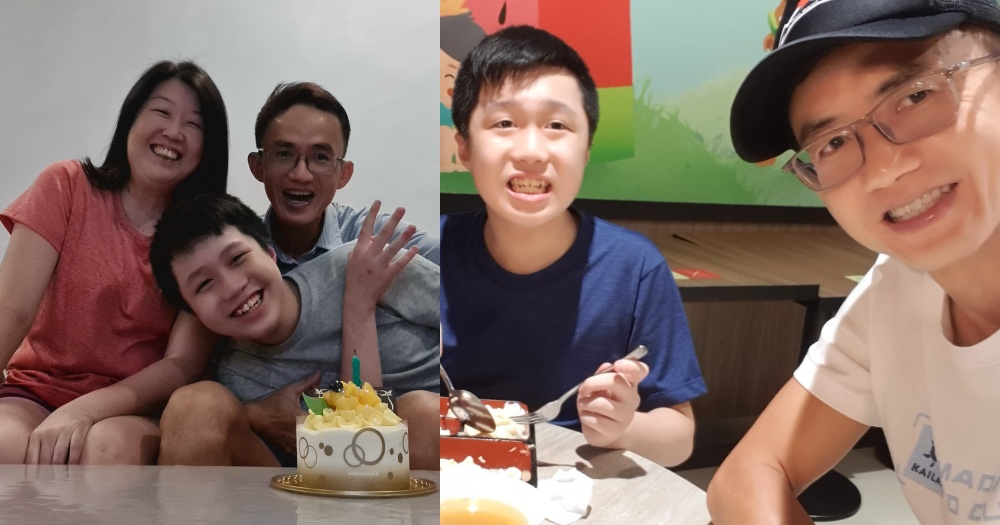Follow us on Telegram for the latest updates: https://t.me/mothershipsg
PERSPECTIVE: Darius Koh, 14, was diagnosed with autism spectrum disorder (ASD) at the age of two and a half. He is currently a student at AWWA School, an institute which provides special education to children with multiple disabilities and children with autism in Singapore.
According to the National University Hospital (NUH), ASD is a lifelong neuro-developmental condition. A child with ASD may have difficulties in social communication and interaction, as well as some restricted and/or repetitive patterns of behaviour, interests or activities. These may be present in varying severity.
When Darius was first diagnosed, he was entirely non-verbal. He only started verbalising at the age of seven. Although his speech has improved over the years, he is still unable to speak in full sentences or clearly express what he wants.
Mothership spoke to Darius’ parents, Andrea Tan and Winson Koh, to get to know Darius better, and to learn about their experience of raising him.
As told to Jane Zhang
Tell us about your son Darius. What are some of Darius’ qualities and hobbies?
Andrea: Darius is actually a very sweet-natured boy. Although he doesn’t really speak, he shows us that he is able to do things on his own. He'll help around with household chores. We don’t expect him to do it, but he still does it.
His hobbies are just like any other teenager — using the iPad to watch YouTube videos. He also likes to scribble numbers and alphabets.
We realised recently that he is able to write Russian alphabets — Cyrillic alphabet. He’s also able to recite the Russian alphabet, as well as other languages like Hebrew and Spanish. He learnt them himself through online YouTube videos. He’s very tech-savvy, more than both of us actually.
And he also loves jigsaw puzzles. We have over 40 boxes of jigsaw puzzles inside his room.
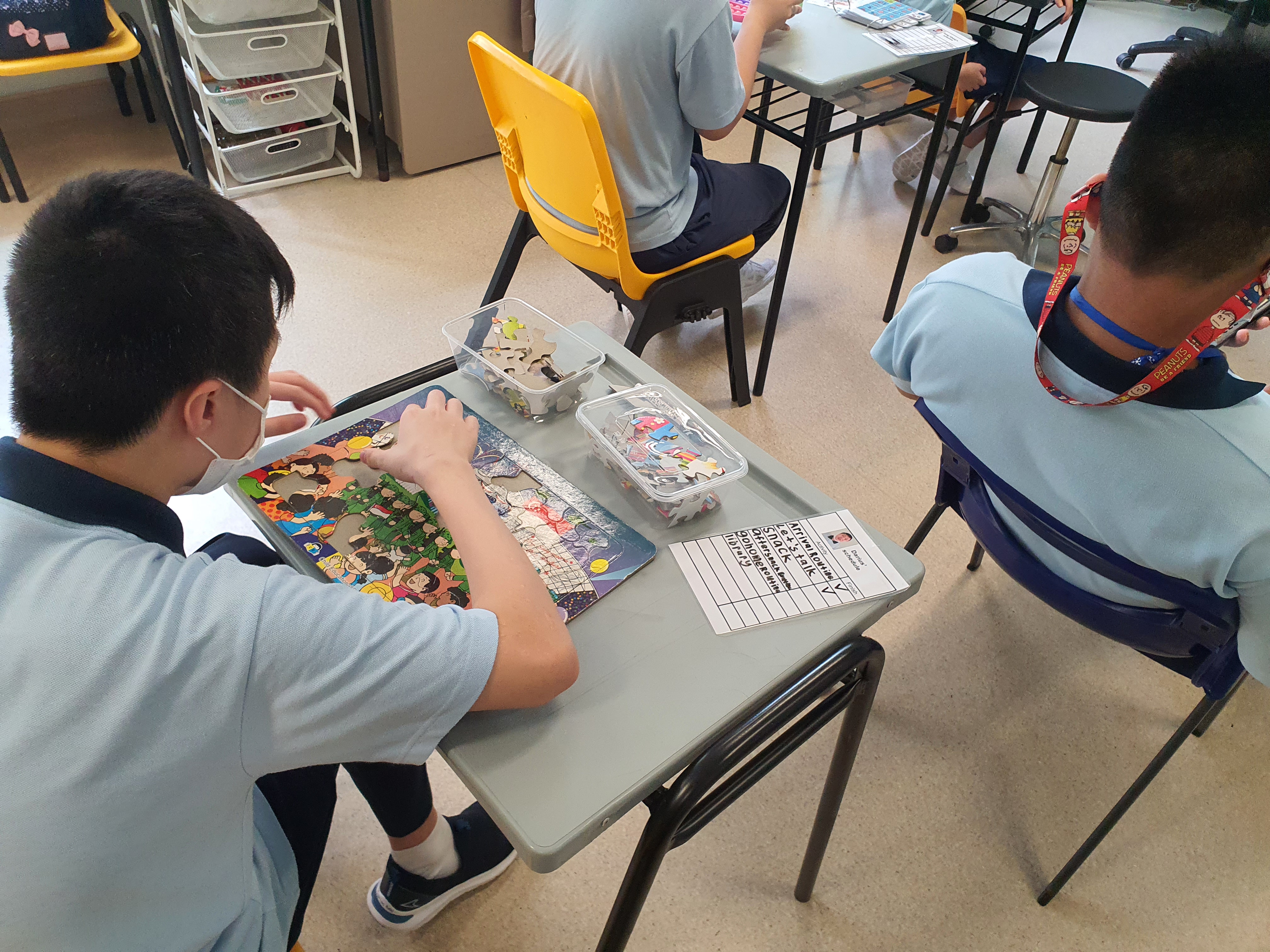 Darius solves a jigsaw puzzle in school. Image courtesy of Andrea Tan and Winson Koh.
Darius solves a jigsaw puzzle in school. Image courtesy of Andrea Tan and Winson Koh.
Winson: Darius also likes it when we praise him. So when he does something good, like if he helps out in the house, we will always tell him, "Well done Darius, good job." And he will be happy.
What does day-to-day life look like for Darius?
Winson: From Monday to Friday, he goes to school. I will send him. We take public transport from our house in Punggol to Hougang, where AWWA School is. He will be in AWWA from 8am to 11am. After that, the school bus will send him to his private intervention centre, where he will stay till 5pm. I will then fetch him and we will both go for our dinner.
We go to different places every day to eat. So every Monday, we go to NEX, Tuesday is Compass One, Wednesday is Hougang Mall, and so on. Darius is the one who chooses where to eat for dinner.
His favourite food is chicken rice. He also likes western food like chicken chop and spaghetti. But he hates vegetables and fruits, just like other kids.
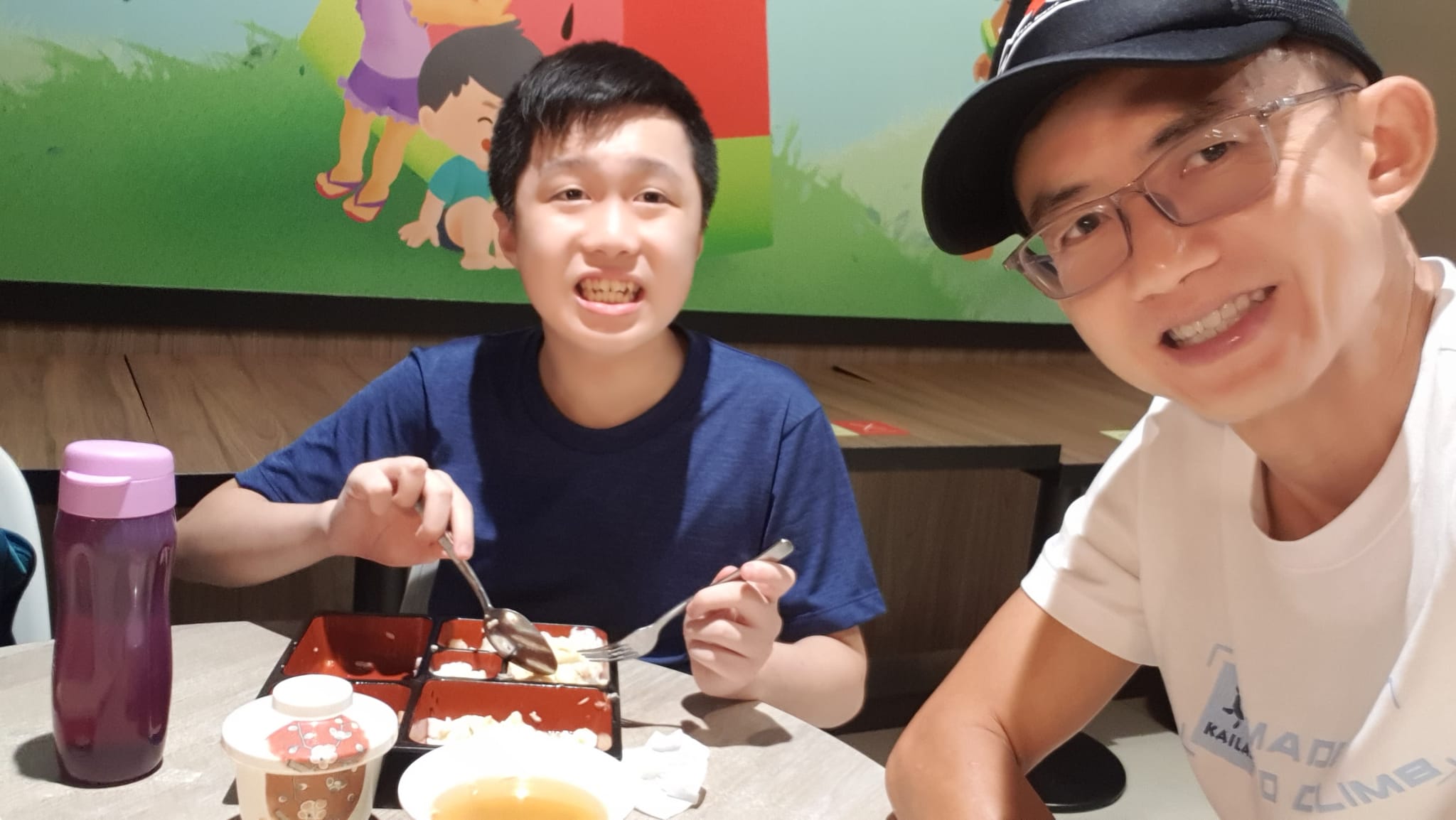 Darius and his father, Winson, have dinner together at NEX's food court. Image courtesy of Andrea Tan and Winson Koh.
Darius and his father, Winson, have dinner together at NEX's food court. Image courtesy of Andrea Tan and Winson Koh.
After dinner, he will get his breakfast for the next day. We will go to this bakery and I’ll let him choose his own breakfast. Then we will go to the supermarket to get him his biscuits. At about 7:30pm, we will get home. I will help him shower and then he will do his own thing like watching YouTube videos or writing. That’s his routine every day.
Andrea: I will come back home from work and after I eat my dinner, I will bond with Darius— play puzzles with him, draw with him. Before he sleeps, I will also read stories to him.
When did Darius first exhibit symptoms of being on the autism spectrum?
Andrea: When Darius was 10 months old, he stopped making eye contact with us. He stopped responding to us. Before he turned 10 months old, he was still blabbering like most babies do but at 10 months, he was suddenly totally silent. I felt a bit uncomfortable so I told my husband that we should bring him for a check-up.
We checked for his ears first because we thought he had some hearing problems. But the hearing test was okay, it was normal. Then the doctor actually suggested that we go for some child development and psychology tests.
So we brought Darius to KKH (KK Women's and Children's Hospital). The doctor told us that Darius showed signs of being on the autism spectrum. He was 18 months old then but could only be formally diagnosed when he turned two and a half. From there, we just needed to wait for his formal diagnosis to officially confirm that he has autism.
When doctors first mentioned "autism", how did you feel?
Andrea: At that time, we actually had no idea what autism was. We didn’t fully understand it, and we were not prepared also. So we felt quite confused and lost. There weren't many resources online at that time so we had some difficulties coping with the news.
For me, I went through all the stages of denial and sadness and so on. But I came to terms with it within like a year or so because I realised that if I don't come to terms with it, if I don't accept the fact as it is, then Darius wouldn't be able to get any help. So in order for him to get help, I had to adjust myself. It was different for my husband.
Winson: It took longer for me [to come to terms with it], around a few years. I didn't believe it. Darius is my first child. It was hard for me lah. And it was also very difficult to face relatives and friends who did not understand Darius and his condition.
Andrea: Darius is our first child. We were hoping to have more kids but because of him, our plans got delayed and eventually, we just didn’t have any more kids. We only have him. It’s a very sad thing because we didn’t plan for this. I mean, no one plans for anything like that, right?
How did your family and friends react to Darius' diagnosis?
Andrea: Both our families are actually quite supportive. My husband’s elder sister actually went to take up some courses in early intervention for children with special needs. She [paid out of pocket for the] expenses to take up the course, and she gave us suggestions and tips she learnt. She also found schools for Darius and made sure that he got the help that he needs.
We really appreciate that because she spent a lot of time and effort on that. For the rest of our family… the older generation could not really understand why Darius is the way he is. It took some time for us to make them understand. We had to explain that Darius is a different kid and whatever we did for him was the best for him.
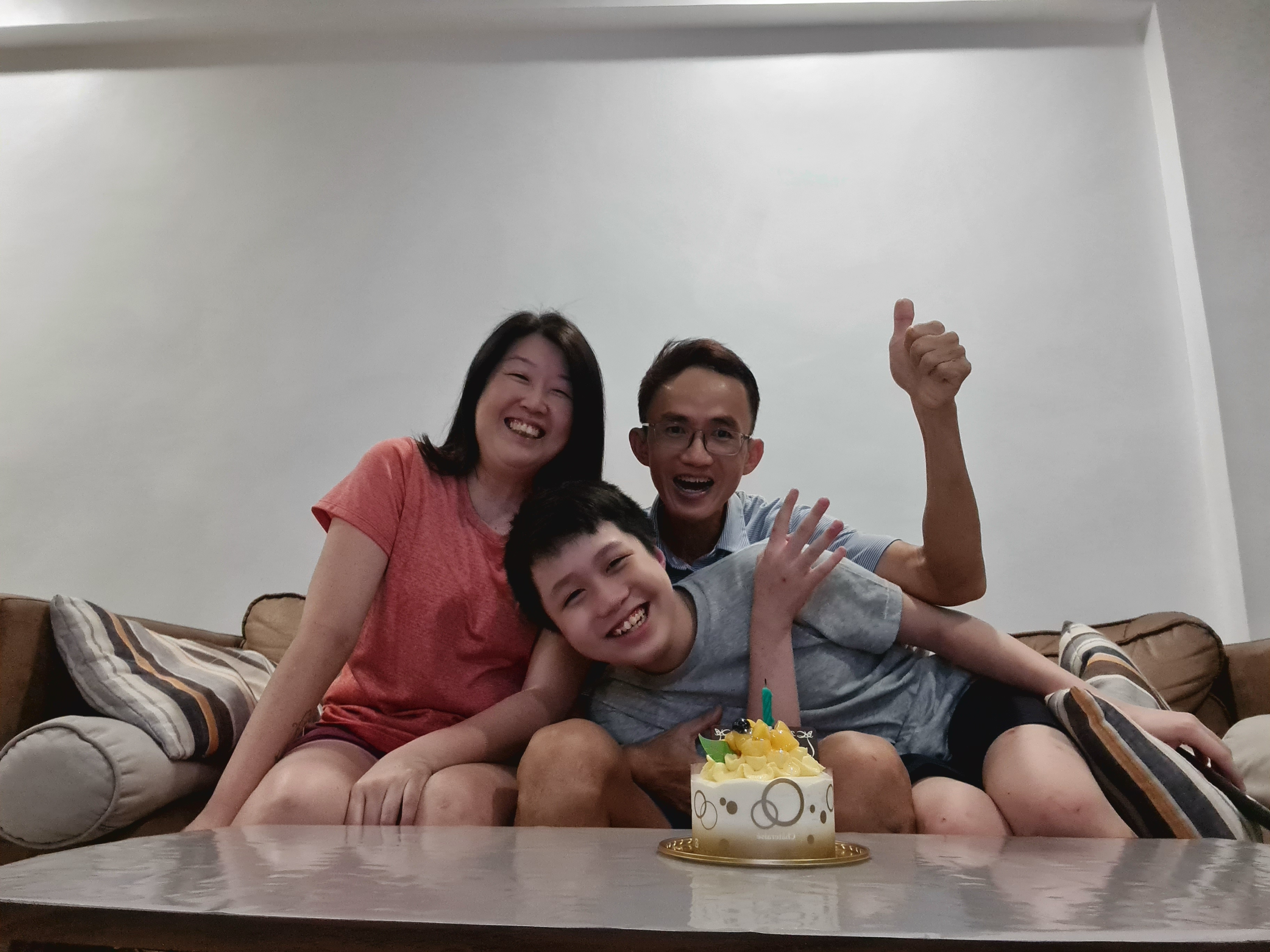 Andrea, Winson, and Darius share a happy moment together on Winson's birthday. Image courtesy of Andrea Tan and Winson Koh.
Andrea, Winson, and Darius share a happy moment together on Winson's birthday. Image courtesy of Andrea Tan and Winson Koh.
Tell us about the challenges you face in raising and taking care of Darius.
Andrea: Honestly speaking, even till now, we can’t anticipate what might happen in the next moment, especially when we are out in public with him. For example, he would sit with us at the table, watching his YouTube videos, and next thing you know, he would suddenly burst into tears and we’re not sure what caused it or what triggered him. That is what we face every day. It’s difficult for us to anticipate what will happen next with him.
Winson: When I fetch him or send him to school, sometimes Darius will throw tantrums and have a meltdown in public. Other people may not understand what’s happening and it can get quite stressful for us. For example, when we’re having dinner and he finds a vegetable he doesn’t like or something, he will throw a tantrum. And then the food will spill on the floor. He will get angry and will start crying. People around him don't understand what he is trying to express.
There have been instances where people come over to us to say, "Can you please control your son? You are disturbing other people here at the coffee shop."
Back when Darius was five or six years old, when he was completely non-verbal, he didn't know how to express himself. So when he had a meltdown, he would roll on the floor, even in public places like in the shopping mall. He would bang his head on the floor and wail until the whole mall could hear him. And some people would walk past and give us that look which said, "Why is your kid like that?"
When that happens, what can we say, you know? I would just apologise and say, "I'm sorry but my son is autistic."
Andrea: Sometimes, I can see it in their eyes— it’s like they’re saying, "Autistic? So what?"
People have misconceptions about autism or any kid with special needs. I’ve had a woman who loudly told her children that they shouldn’t go near people like Darius. It was very hurtful. She’s saying as if kids cannot go near my son like he’s contagious or something.
To immediately judge a child like that... it was very hurtful for me. I teared up. I know that no matter how much I explain, others will not understand because they haven't been through the struggle that we have. We can't blame them as well.
I just tell myself that I will teach my son as best as I can. That’s all I can do. And whenever we’re out, we will try our best not to trigger Darius and we will avoid anything he doesn't like.
Have you had any positive experiences from members of the public?
Andrea: Our neighbours are very supportive. They know of Darius' condition and take the initiative to say "hello" to him and to interact with him even though they know that he isn't able to respond that well. But the effort and intention are enough, you know? We’re quite blessed to have good neighbours lah.
Winson: Every Thursday evening, Darius would always buy steam buns from this same shop we always go to. The auntie there knows Darius and tries to interact with him also.
Andrea: There are some people who are positive and considerate. They understand our difficulties and try their best to interact with Darius, which helps him a lot so that he can slowly learn and integrate and be part of society.
But the general public don't usually tend to take the time to understand kids with special needs, not just autism but other special needs conditions as well like ADHD (attention-deficit/hyperactivity disorder) or down syndrome. The public usually don't understand unless they have someone in their family with the same condition.
What kind of support do you think is necessary for kids with special needs, as well as the caretakers of these kids?
Andrea: Have more events to allow the general public to mingle with kids with special needs. They are no different from us. They are just waiting to be accepted. I mean, everyone wants to be accepted into society, right? These events will help the kids with special needs to socialise and interact with members of the public.
Autism awareness month is only in April every year, but what can one month do? You know what I mean? The Purple Parade also happens only once every year. I feel that more can still be done. These events only happen once a year and that’s all. People tend to forget quite quickly.
What do you think Darius' future will look like?
Andrea: This is actually our biggest concern and fear. I mean, this is what all parents think about. But for us in particular, we're worried because Darius is still quite dependent on us. Even at 14 years old, he still needs help when showering and crossing the road.
Winson: He doesn't understand the dangers of crossing the road. Even when cars are approaching, he would still want to cross the road and we have to pull him back. We have been reminding him over and over again to look left and right, to make sure there are no cars but he still doesn't have that understanding yet. I have been practising with him in the carpark, teaching him the right way to cross the road. He’s still learning.
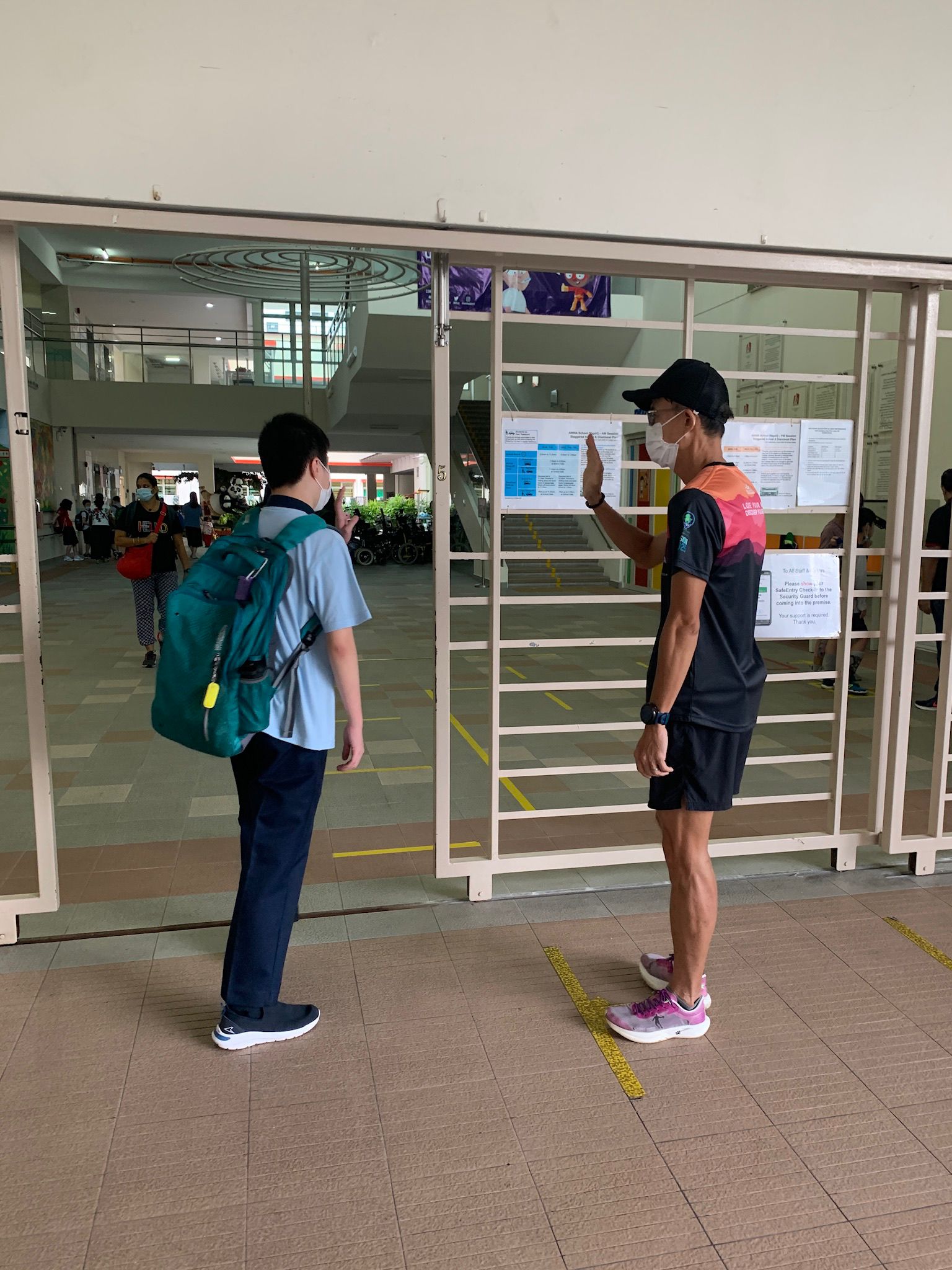 Winson will chaperone Darius to school every day. Image courtesy of Andrea Tan and Winson Koh.
Winson will chaperone Darius to school every day. Image courtesy of Andrea Tan and Winson Koh.
Andrea: In Singapore, there is still an emphasis on academic qualifications. It’s normal to see everyone go to university and get a degree. But for Darius, he doesn’t have any academic qualifications. He didn't go through PSLE, he won't go through O-Levels. He’s basically considered a "nothing".
So how is he able to cope in a society where there’s high cost and high standard of living? Right now, it’s still okay because we’re still around and we’re providing for him. Of course, we will set up a special needs local trust fund for him but who is there to actually manage the expenses for him when we're gone? Currently, Darius still doesn’t know how to count money so he won't know how to manage his finances. He has no siblings. His aunts and uncles would either be gone or too old by the time he grows up. It is also very selfish of us to ask a relative to take care of him when we’re gone. I don’t think that’s fair either.
When he’s 18 years old, he will be out of AWWA. He’ll either be in a sheltered workshop or work in an establishment for special needs people. But the salary won’t be enough for him to cope. We’re trying our best to find ways to help his future. But there are limitations, we won't be able to anticipate what will happen next time.
Every time we think about this, we can't help but feel frightened and very sad. It’s a harsh reality.
What are some of the things you have done to prepare Darius for his future?
Winson: We have a trust fund for him. And we will continue to train and teach him to be independent because eventually, he will be alone. Hopefully, that will help him.
Andrea: Maybe down the road, new things might crop up and we’ll see how else we can help him. In Singapore right now, the awareness of autism is still quite low in my opinion. In the streets, Darius still gets shunned. He has no friends and I’m afraid he'll be lonely when we’re gone. Of course, I hope that won’t be the case. I hope he’ll be able to make friends but we need to start by having more exposure for the general public.
Despite the stress, worries and challenges, what has someone like Darius taught both of you?
Winson: For me... I was a very hot-tempered person before we had Darius. With Darius around, I'm more controlled. We are trying our best to take care of him.
Andrea: Darius taught me a lot about patience. Before I had Darius, I wanted things done quickly. But after I had him, I learnt to slow down and have more patience.
He also taught me to open up my eyes to see what is around me. Before Darius, I never had time for that, I was never aware of what was happening around me. I was always concentrating on my work. I had no time to think or reflect on my life.
And because of Darius also, I learnt not to judge others. I began to empathise more with parents of kids with special needs. There’s so many instances that we see when we're out in public— other parents who are in the same shoes as us. We empathise with them because we understand the struggles and the hardships they are going through.
I hope the public can understand that people like Darius... they’re not any different from other people. They’re harmless. They just need to be understood. All it takes is some time, effort, and empathy and you will realise that people like Darius are just humans.
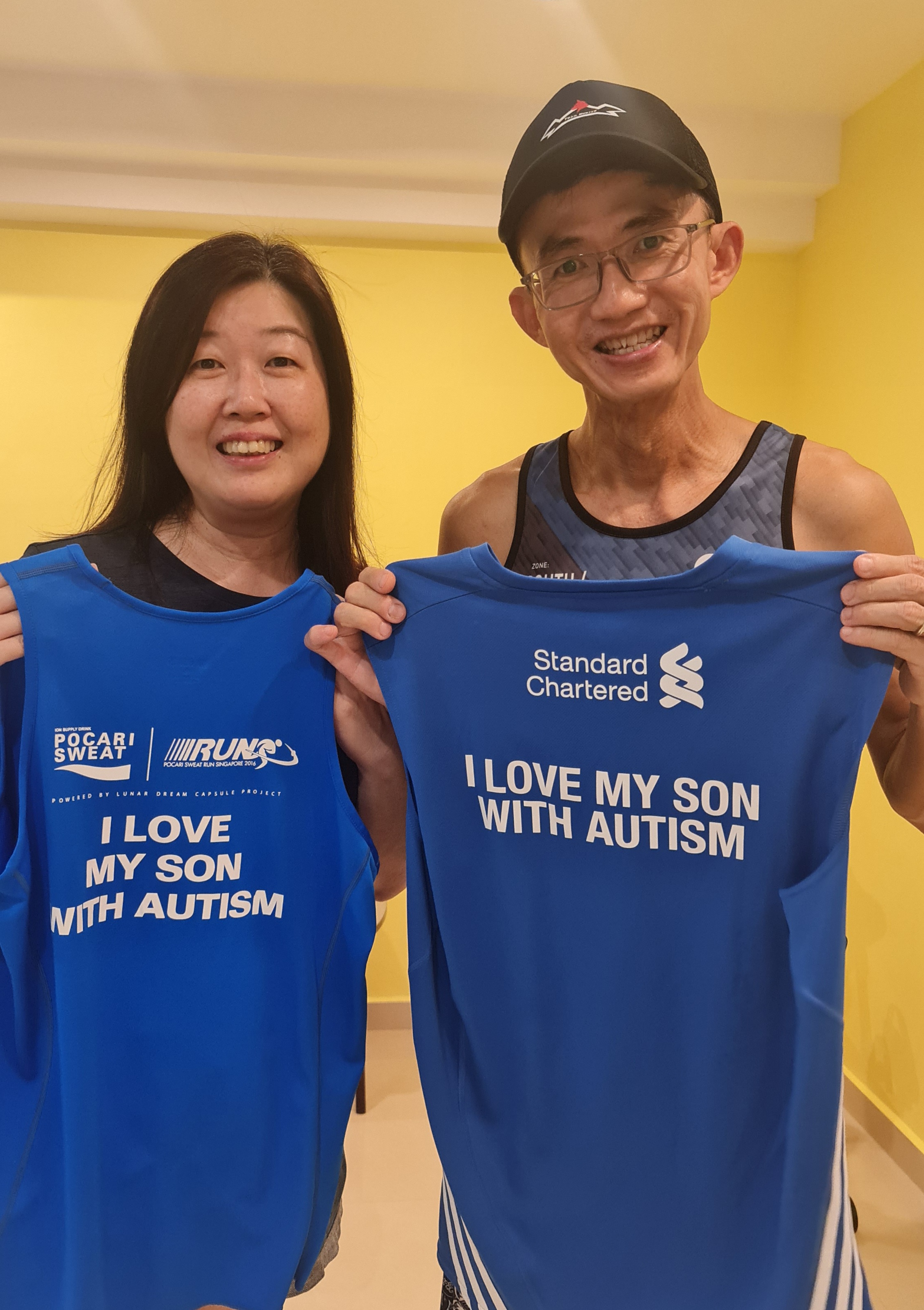 Image courtesy of Andrea Tan and Winson Koh.
Image courtesy of Andrea Tan and Winson Koh.
Top images courtesy of Andrea and Winson. Quotes were edited for clarity.
If you like what you read, follow us on Facebook, Instagram, Twitter and Telegram to get the latest updates.
